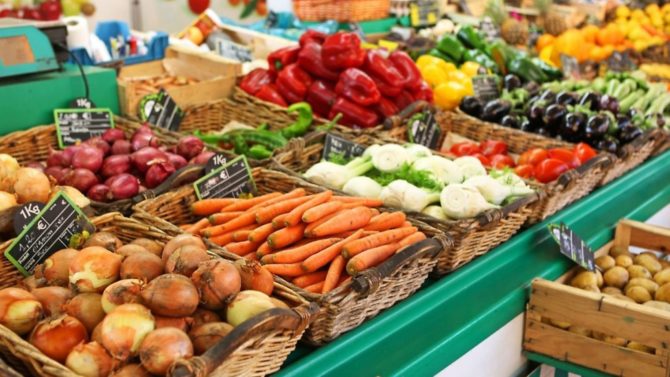There’s nothing quite like a French market

Market days are an integral part of the traditional French lifestyle. There are passionate sellers and quality local products, plus it can be a fun social experience as Monique Jackman discusses

One spring, my husband and I spent a month in an apartment overlooking the seafront at Agay, a small town on the Côte d’Azur. The weekly market was held in the car park below our balcony and it was lovely to lie in bed, listening to the quiet banter of the marchands (stallholders) as they unpacked their goods at 7am. A few hours later we watched them pack up again; some stalls took well over an hour to do. Yet this was done in the same efficient manner and with the same joie de vivre. As I watched a couple pack up a seemingly endless collection of dishes, pots, boxes, cloths, machines, utensils and charcuterie, I decided that running a market stall must be the ultimate labour of love.
An enduring tradition
It seems the passion for traditional markets endures in France, no matter how society modernises. The little town of Angoulins, a walk down the coast from La Rochelle, has a population of 3,500, a few essential shops and a huge out-of-town shopping centre just 2km away with two large supermarkets and large furniture and clothing outlets. Yet in 2005, my husband and I watched a shelter being built for a covered open-air market in the church square.
There is certainly nothing quite like a French market to turn the mundane activity of food shopping into a delight, as every Francophile will attest. Their importance in French life is perfectly illustrated by the road signs at the entrance to many a community that list market days and by the municipal leaflets listing pretty much every market day within driving distance.

Even so, sometimes you can get caught out. My friends once missed the notice put up in their local car park to warn motorists that it was out of bounds on market days. They were surprised to park there one evening and find it completely empty, but even more surprised the following morning when they came back to find their car completely immersed in a crowded market!
Relaxing and socialising
Something I love about market day is the relaxed atmosphere. Friends swap news in the street and meet for coffee, stallholders patiently explain the provenance of their produce, how to keep it, how to cook it, how to serve it, how to eat it. Customers prod and smell the produce, accepting nibbles of cheese or crackers smeared with conserves. Everything moves at a snail’s pace, yet the stallholders never seem to tire of answering questions and the customers queue with good grace.
Sometimes, soft music plays over tannoys or buskers entertain the crowds, adding to the cheerful ambiance. In Biarritz, we found locals not only singing Basque songs, but also distributing sheets with the lyrics to onlookers so that we could join in! In Brittany and Normandy, we saw that some stallholders liked to wear their traditional costume, which certainly added to the festive atmosphere.

Customer care
Whatever I buy, I feel confident that the stallholder cares and wants to give me value for money. I once asked for 3kg of potatoes and the lovely marchande asked me whether I would like small ones, medium ones or big ones. As she chose my potatoes one by one, she told me that they would be as good sautéed, roasted or boiled. Once, a stallholder put a free bunch of fresh parsley in my carrier bag, with the three bits and pieces that I had bought, without a word to me. Another time, a marchande carefully handed me “le sac fragile” (with vegetables and fruit that might get crushed) “et l’autre sac”, the bag containing the more robust produce.
When I bought three melons recently, after some handling, touching and pressing of the fruits, the marchand gave me two melons “for today” and the third one for “tomorrow or the day after”, and he explained that he pulled the stem right off the latter so that I would know which was which. At a stall selling mainly strawberries, I heard an old lady emphasise to the stallholder “Attention, je veux les fraises pour demain ou après-demain” (I want the strawberries for eating tomorrow or the day after tomorrow, mind!). This request was taken very seriously on both sides, as seller and customer carefully looked for the best punnet for tomorrow or the day after tomorrow.
Regional products
Picking up local and regional products (produits du terroir) is one of the great joys of a market. It does feel special when you open a pot of honey and see on the label the full name, address and phone number of the beekeeper.
This can lead to some niche stalls. One stall at my local market sells biscuits – just one type. They could not look more plain to me, but nobody tries a sample without buying some. One stall I visited in Quiberon, Morbihan, sold just two types of apples, and I remember how mouth-watering the two mountains of large fruits smelled and looked.
I can still remember the quiet and smiling eyes of a little old lady in the market at St-Malo. She must have been at least 80. It was 8.30am; my husband and I were walking to our ferry for the crossing back to the UK, and this lady had a pile of walnuts to sell. Someone had written with a biro on a torn piece of cardboard ‘noix du pays’ (locally grown walnuts).
And in Nice, one winter, I stopped at the smallest stall in a very long market to browse through the thick photo album of the beloved goats of a young trader. The man was slim, all in black, wearing a long cape and a large feathered hat. I marvelled at the fact that this serene goatherd, who looked about a century behind the times, had the time to look after his beloved animals in the hills, make a few cheeses with their milk, and sell the fromages de chèvre for a living.
But I suppose that is why French markets are magnets. Not only is eating a major pleasure in France, but it’s a pleasure to give your custom to people who love their jobs.
Monique Jackman is the author of Better French, Better French 2 and Conversational French Made Easy, available from Amazon and other bookshops
_______________________________________________________________________
You might also like
8 things that are officially part of France’s cultural heritage
Share to: Facebook Twitter LinkedIn Email


